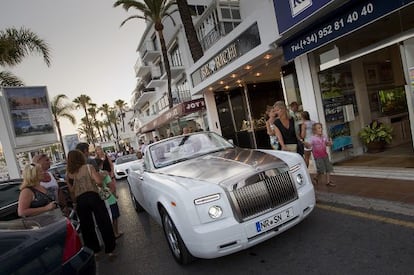The Puerto Banús bubble
In search of signs of the crisis in the Marbella millionaires' playground

Puerto Banús: the place with the highest number of designer stores per square meter in the whole world (Dolce & Gabbana, Valentino, Louis Vuitton, Jimmy Choo, Blablabla...) Mission: Try to find some signs of the crisis here. It's a complicated one at first glance. Banús is the Marbella theme park where, rather than pose for a picture with Mickey Mouse, you take one in front of a 90-meter yacht with a Bentley on the deck and six models in bikinis sipping on martinis. One comes here to watch the rich, or play at being one of them. It's a good plan in times of economic depression, as well as a great catalyst for revolution.
Only the British tourists can rival the Russians for the gold medal of bad taste
In the event the revolution does start, don't expect the Russians to turn up. There was a time when the biggest fright you could give a Christian was to say, "The Russians are coming!" These days, the main wish of locals in Banús - and Marbella in general - is for more of them to come. As a Canarian tells me, "they always order 10 of everything." Forget about the Germans - in restaurants, hotels, real estate offices, the mantra is the same: the Russians are our salvation. Thanks to their spectacular vulgarity and desperate eagerness to overcome half a century of complexes regarding Western capitalism, the children of the Soviet proletariat are the largest contributors to the only growing part of Spain's economy. Ex-dictator Francisco Franco, and former Tourism Minister Manuel Fraga, the fathers of the coastal boom, would be turning in their graves.
Only the British tourists can rival the Russians for the gold medal of bad taste; they are the eternal pillar of the Spanish tourism industry - God Save the Queen. They don't walk around with 500-euro bills in their pockets (in a small supermarket, a Russian ahead of me in the queue offered the cashier a 500-euro bill having only bought 9.80 worth of groceries), but they are plentiful. In contrast to the handful of Spanish tourists you see in Banús (who do try to preserve a certain dignity), the British buy into the delusion they belong to the jet set. They can be found in all their crude splendor at the Ocean Club, a white, walled-in ship (to distance themselves from the crowd), with a gigantic swimming pool surrounded by an archipelago of sun loungers that cost 325 euros a day. Separated from the remaining mass of tanned asses, the hordes of British travelers inebriate themselves with fervor, make out on the sun loungers in clear slight of everyone, washing it all down with French champagne and hamburgers. There is a discreet enclosure in the corner with tables and place mats, but the British don't go near it: the menu and wine list are much too sophisticated. Only others venture there, such as the Dutch, French and Belgians, who, unlike others, have evolved to enjoy the art of conversation and fine food.
I've been told that many of the British work boring jobs that pay very little, and save up all year for a week of exhibitionism in this Babylonian scene. The Ocean Club, like most of Puerto Banús, sells the illusion of exclusivity, as well as the dream that by being granted access one has gained admission to the beau monde . I subscribed to the dream. I went to Billionaire, a club owned by the repulsive Flavio Briatore, Formula 1 figure and ex-boyfriend of the equally repulsive Naomi Campbell, where drinks reportedly go for 45 euros a glass. This was not quite true, offering an inkling of the crisis I was looking for: they only cost 15 euros. Actually, the first sign should have been that they let me in, despite not having arrived in a Ferrari, or with a Versace-clad beauty on my arm, generally lacking the billionaire air. I suppose the guests choose not to reflect on these cruel truths, despite the pretentious pink furniture (half Dalí, half Ikea) that adorns the den, and the basic bathrooms, which you could find in any other bar. If the furniture were removed, the Billionaire Club would be no more than an abandoned patio.
Some metaphor for the crisis should have been found here, but I came across a better one on a night stroll by the port. A Spanish family - a middle-aged couple with their two children - with their noses pressed up against the window of a watch shop. As their eyes took in the Rolexes, Cartier's and Richard Mille's, my mind went to a scene of Oliver Twist , the Dickens classic, where a couple of orphans salivate before a table of fat bankers devouring mounds of roast beef, cabbage and potatoes. More real than that of Puerto Banús, it is an accurate image of the current times.
Tu suscripción se está usando en otro dispositivo
¿Quieres añadir otro usuario a tu suscripción?
Si continúas leyendo en este dispositivo, no se podrá leer en el otro.
FlechaTu suscripción se está usando en otro dispositivo y solo puedes acceder a EL PAÍS desde un dispositivo a la vez.
Si quieres compartir tu cuenta, cambia tu suscripción a la modalidad Premium, así podrás añadir otro usuario. Cada uno accederá con su propia cuenta de email, lo que os permitirá personalizar vuestra experiencia en EL PAÍS.
¿Tienes una suscripción de empresa? Accede aquí para contratar más cuentas.
En el caso de no saber quién está usando tu cuenta, te recomendamos cambiar tu contraseña aquí.
Si decides continuar compartiendo tu cuenta, este mensaje se mostrará en tu dispositivo y en el de la otra persona que está usando tu cuenta de forma indefinida, afectando a tu experiencia de lectura. Puedes consultar aquí los términos y condiciones de la suscripción digital.








































